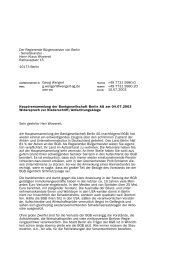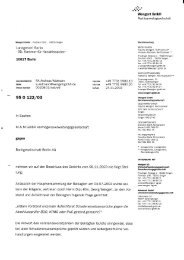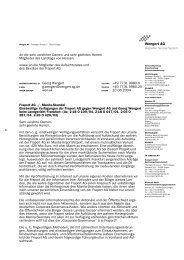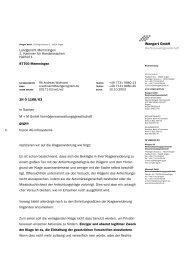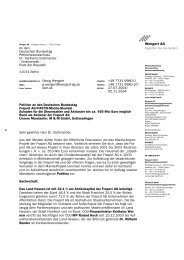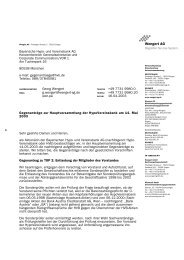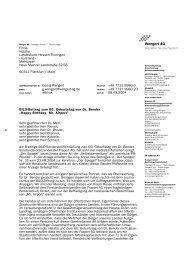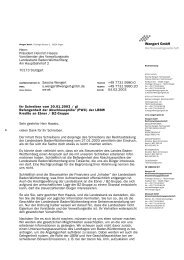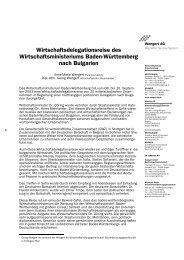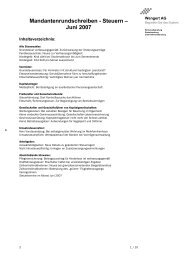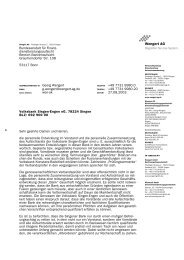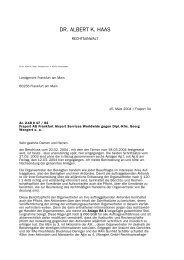Wengert GmbH - Wengert Gruppe
Wengert GmbH - Wengert Gruppe
Wengert GmbH - Wengert Gruppe
Create successful ePaper yourself
Turn your PDF publications into a flip-book with our unique Google optimized e-Paper software.
<strong>Wengert</strong> <strong>GmbH</strong> . Friedinger Strasse 2 . 78224 Singen<br />
Regional court Frankfurt am Main<br />
Court division handling commercial matters<br />
<strong>Wengert</strong> <strong>GmbH</strong><br />
Rechtsanwaltsgesellschaft<br />
60256 Frankfurt am Main<br />
Rechtsberatung<br />
Persons responsible Certified Accountant Georg <strong>Wengert</strong> TELEFON +49 7731 9980.0<br />
Attorneys: Andreas Widmann TELEFAX +49 7731 9980.20<br />
Sascha <strong>Wengert</strong> Date 23.07.2003<br />
EMAIL g.wengert@wengert-ag.de<br />
Our reference 00204-03/wd/wd<br />
DEUTSCHLAND<br />
Postfach 501 . 78205 Singen<br />
Friedinger Strasse 2 . 78224 Singen<br />
fon +49.7731.99 80-0<br />
fax +49.7731.99 80-20<br />
e-mail info@wengert-gmbh.de<br />
www.wengert-gmbh.de<br />
<strong>Wengert</strong> <strong>GmbH</strong><br />
Rechtsanwaltsgesellschaft<br />
GESCHÄFTSFÜHRER<br />
Sascha <strong>Wengert</strong>, Rechtsanwalt<br />
SITZ DER GESELLSCHAFT<br />
Singen<br />
REGISTERGERICHT<br />
Singen HRB 1740<br />
Legal Action<br />
of the M + M <strong>GmbH</strong> Vermögensverwaltungsgesellschaft, Oderstraße 35,<br />
78244 Gottmadingen, legally represented by the sole authorized representative<br />
general manager Ms. Anne-Marie <strong>Wengert</strong> ibidem<br />
Person with power of attorney:<br />
- plaintiff -<br />
<strong>Wengert</strong> <strong>GmbH</strong> Rechtsanwaltsgesellschaft, Friedinger Str. 2, 78224 Singen<br />
(Barristors and Solicitors)<br />
vs.<br />
Fraport AG Frankfurt Airport Services Worldwide,<br />
60547 Frankfurt am Main<br />
GESCHÄFTSKONTO<br />
Dresdner Bank AG Konstanz<br />
Konto 5 822 300 00<br />
BLZ 692 800 35<br />
RA-ANDERKONTO<br />
Dresdner Bank AG Konstanz<br />
Konto 5 822 300 01<br />
BLZ 692 800 35<br />
IM VERBUND MIT<br />
<strong>Wengert</strong> AG<br />
Wirtschaftsprüfungsgesellschaft<br />
Steuerberatungsgesellschaft<br />
Friedinger Strasse 2 . 78224 Singen<br />
Postfach 501 . 78205 Singen<br />
fon +49.7731.99 80-0<br />
fax +49.7731.99 80-20<br />
e-mail info@wengert-ag.de<br />
www.wengert-ag.de<br />
Allconsult <strong>GmbH</strong><br />
Unternehmensberatungsgesellschaft<br />
Oderstr. 35. 78244 Gottmadingen<br />
fon +49.7731.99 80-0<br />
fax +49.7731.99 80-20<br />
e-mail info@allconsult-gmbh.de<br />
www.allconsult-gmbh.de<br />
legally represented by the chief executive officer Mr. Dr. Wilhelm Bender as well<br />
as the other executive board members Mr. Prof. Dr. Manfred Schölch, Mr. Dr.<br />
Stefan Schulte, Ms. Prof. Dipl.-Ing. Barbara Jakubeit, Mr. Herbert Mai and Mr.<br />
Peter Schmitz, ibidem, as well as the supervisory board, namely the executive<br />
chair Mr. Roland Koch, c/o the State Chancellery of Hesse, Bierstadter Straße<br />
2, 65189 Wiesbaden<br />
on the grounds of:<br />
contesting the resolutions of the general shareholder meeting<br />
- defendant -
- 2 -<br />
in the name of the plaintiff and her power of attorney the following charges are<br />
brought with the following claims:<br />
1. The defendant's general shareholder meeting resolutions of June 25,<br />
2003 at which the exoneration of the management committee (point<br />
two of the agenda) and that of the supervisory board (point three of the<br />
agenda) were issued are declared null and void.<br />
<strong>Wengert</strong> <strong>GmbH</strong><br />
Rechtsanwaltsgesellschaft<br />
Rechtsberatung<br />
2. The defendant bears the court costs.<br />
On the grounds of:<br />
The plaintiff is a partnership with limited liability based in 78244 Gottmadingen.<br />
It is registered at the Commercial Register Singen under the commercial<br />
register HRB 290. At the time of the defendant's general stockholders meeting<br />
on June 25, 2003 the plaintiff was a share holder of the defendant and is so to<br />
this day. Shareholder of record can be substantiated among others from certification<br />
at the Baden-Würtembergischen Bank AG and the plaintiff's share register.<br />
Evidence:<br />
Written confirmation from the Baden-Wuerttembergischen-<br />
Bank AG<br />
- Enclosure K 1-<br />
The defendant is a stock corporation based in Frankfurt am Main, registered<br />
with the Commercial Register of the district court Frankfurt am Main under<br />
commercial register HRB 7042. The company's activity is the operation, maintenance,<br />
development and the expansion of the Frankfurt am Main airport and<br />
other airports in and outside of Germany as well as the performance of related<br />
services and the application and marketing of knowledge and abilities of such<br />
activities in Germany and elsewhere. Due to the fact that the controlling interest<br />
in the company is held by the Federal Republic of Germany (18.4%), the<br />
Land Hesse (32.1%), the Stadtwerke Frankfurt am Main Holding <strong>GmbH</strong> (20.5%),<br />
and that there exists a consortium agreement between these parties, the defendant<br />
is a publicly owned company.<br />
On June 25, 2003 the defendant held its ordinary general meeting in Frankfurt.<br />
Among the items on the agenda were the following:<br />
• Topic 2: passing of a resolution to exonerate the management<br />
board for the business year 2002<br />
• Topic 3: passing of a resolution to exonerate the supervisory<br />
board for the business year 2002<br />
The resolutions put forward by the administration, that is to grant the exonerations,<br />
were passed by the general meeting. However, exoneration should not<br />
have been granted for the following reasons:<br />
From the defendant's management report 2002 and the attached year-end report<br />
to Dec. 31, 2002, it is discernible that as a result of the special burden<br />
resulting from the complete write-off of the financial engagement at the terminal<br />
construction at the Ninoy Aquino International Airport in Manila, the defendant<br />
is reporting a net profit of zero for the business year 2002 and because of<br />
this is unable to distribute a dividend for this fiscal year.
- 3 -<br />
Evidence:<br />
the defendant's annual report for 2002 (page 11) which is being<br />
presented in the contest.<br />
<strong>Wengert</strong> <strong>GmbH</strong><br />
Rechtsanwaltsgesellschaft<br />
In the year 2002 unbudgeted write-offs in the amount of EUR 289,500,000<br />
occurred in relation to the Manila project. In the year 2001 the write-offs added<br />
up to EUR 59,100,000.<br />
Rechtsberatung<br />
Evidence: the defendant's 2002 business report (page 95)<br />
According to press reports the defendant intends to make investments totalling<br />
USD 380,000,000 by the beginning of May 2003.<br />
Evidence: press report in the Handelsblatt of 06. 05. 2003<br />
-Enclosure K2-<br />
Up to this date funds in this amount have been spent for the involvement in<br />
and for loans, guarantees and suretyships for a company called "Philippine<br />
International Air Terminals Co. Inc." ("POATCO"), based in Manila/Philippines.<br />
By now the interim damage runs at a minimum of EUR 450,000,000.<br />
Evidence:<br />
Expert's report<br />
A further significant financial loss is to be expected. In the meantime the defendant<br />
has conceded the total write-off for the financial engagement in the<br />
Manila project.<br />
Evidence: defendant's business report for 2002 (page 11)<br />
The background facts are: In 1999 the defendant acquired a 30% share in the<br />
company PIATCO, which was to build a new passenger terminal (Project "NAIA<br />
IPT 3") at Manila International Airport (Ninoy Aquino International Airport –<br />
"NAIA"). The company PIATCO was established during 1996 by the Philippine<br />
business person Cheng. During 1997 PIATCO entered into several contracts<br />
with the Philippine government in power at that time. Before the defendant acquired<br />
an interest in PIATCO in 1999, its management committee arranged for<br />
a due diligence audit to be conducted by a law firm based in Manila.<br />
Evidence:<br />
Legal due diligence report to be presented by the defendant<br />
This due diligence report showed that the contracts entered into with the Philippine<br />
government during 1997 regarding the operating franchise of a third<br />
airport terminal with the project name NAIPA ITP 3 are null and void and/or<br />
contestable because they contravene Philippine law.<br />
This due diligence report was also forwarded to the defendant's supervisory<br />
board. Nonetheless the supervisory board approved an investment.<br />
Evidence:<br />
Testimonial from the supervisory board members involved,<br />
whose names and addresses are to be provided by the defendant
- 4 -<br />
Supervisory board meeting minutes which the defendant is to<br />
provide<br />
<strong>Wengert</strong> <strong>GmbH</strong><br />
Rechtsanwaltsgesellschaft<br />
In addition the above mentioned due diligence report was not mentioned in the<br />
defendant's prospectus.<br />
Rechtsberatung<br />
Evidence:<br />
Defendant's prospectus from 08. 06. 2001 to be provided by<br />
the defendant<br />
Also an additional experts report commissioned by the supervisory board and<br />
conducted by the law firm Haarmann, Hemmelrath and Partners in 2002 concluded<br />
that an involvement in PIATCO would result in a considerable risk.<br />
Evidence:<br />
Experts report by the law firm Haarmann, Hemmelrath and<br />
Partners, to be provided by the defendant<br />
At this time the defendant's interest in PIATCO amounts to about 40%, that of<br />
the family-owned company Cheng/Philippines about 60%. At the same time the<br />
defendant put up the lion's share of the EUR 500,000,000 investment so far<br />
with a minimum of about EUR 450,000,000, resulting in a total investment<br />
volume of at least 80%, but holding only 40% of the voting rights.<br />
In May of 2003 the highest court in the Philippines declared the consortium's<br />
contracts for null and void because when the contracts were awarded in 1997<br />
PIATCO did not have sufficient financial capacity at its disposal.<br />
The court hereby confirmed the corresponding decision of the new Philippine<br />
government under president Arroyo.<br />
The new government also voiced the concern that PIATCO's terminal contracts<br />
with the former government were entered into under the suspicion of corruption.<br />
Evidence: Press report in the Handelsblatt of 06. 05. 2003<br />
-Enclosure K 2-<br />
At this time the Manila Project NAIA IPT 3 is almost completed, stands empty<br />
and is not being used causing additional costs to incur. Due to interest receivable<br />
in the millions, the defendant's commitment in Manila with guarantees<br />
and suretyships had already reached a level of EUR 400,000,000 by the third<br />
quarter of 2002. Already in 2001 the defendant was forced to make extraordinary<br />
write-offs in the order of EUR 60,000,000 at the Philippine project. One<br />
must assume that to this point in time a total damage of EUR 450,000,000<br />
has accumulated.<br />
1. The defendant's management committee has disregarded the following<br />
responsibilities:<br />
§ 91 II of the companies act requires that the management committee must<br />
introduce measures, in particular to set up a supervisory system, so that developments<br />
endangering the continued existence of the company are recognised<br />
early on. § 91 II of the companies act puts in concrete terms different
- 5 -<br />
aspects of the management responsibilities according to § 76 I of the companies<br />
act. Here it deals with the management board's overall responsibilities.<br />
§91 II commits the management committee to ensure, through appropriate<br />
measures, the early recognition of developments endangering the existence of<br />
the company (ensuring the company's survival). What is more, §91 II of the<br />
companies act is to be read in connection with § 317 IV of the companies act<br />
which includes appropriate measures for companies with official stock market<br />
quotation for their year end audit.<br />
<strong>Wengert</strong> <strong>GmbH</strong><br />
Rechtsanwaltsgesellschaft<br />
Rechtsberatung<br />
Essentially the law (companies act, German commercial code) requires the<br />
establishment of risk management.<br />
Developments jeopardizing the existence of a business are changes in risk<br />
levels specific to each enterprise. According to the preamble (Reg. Begr., BT-<br />
Drucks. 13/9712 page 15) this also includes the involvement in risky businesses.<br />
Under this preamble ‘jeopardizing the existence of a business’ means<br />
that damaging changes can have a considerable effect on the net worth position,<br />
profitability or the financial situation of the stock corporation (Hüffner,<br />
companies act, § 91 Rz. 6). The managing board must implement measures<br />
leading to the early detection of developments described above. Developments<br />
are recognized when the management board becomes aware of them. It is best<br />
for this to happen when corrective action can be applied early enough to prevent<br />
jeopardizing damages from causing extensive harm (compare with Reg.<br />
Begr., BT-Drucks. 13/9712 page 15). In particular the management committee<br />
must establish a supervisory system which monitors the implementation of the<br />
early detection measures introduced.<br />
Furthermore management committee members must apply the care of an orderly<br />
and conscientious business manager (§ 93 I 1 companies act). The description<br />
found in § 93 I 1 companies act is more tangible, connecting with the<br />
version in § 76 I companies act of general rules of conduct in §§ 276 I 2 of the<br />
German civil code, and 347 German commercial code. Important is how a conscientious,<br />
independently acting manager of a company of a specific kind, who<br />
does not deal with his own resources but, like a trustee, is responsible for the<br />
investment of others, is to conduct himself (compare BGHZ 129, 30, 34). In<br />
addition members of the management board are subject to loyalties extending<br />
above and beyond the standards set in § 242 of the German civil code. With<br />
the appointment to the management board the loyalties have a contractual<br />
basis so that a derivation from § 93 I 1 of the companies act is not required.<br />
In this case no effective control system in the sense of § 91 II of the companies<br />
act was established. Otherwise it would have become evident during the<br />
assessment for the participation in the company Piatco that right from the beginning<br />
there existed grounds for contestation and or revocation under Philippine<br />
law regarding the terminal contracts. ‘Developments jeopardizing the existence<br />
of a business’ also includes the entering of a business transaction<br />
where a very high risk level is involved (compare Hüffer, § 91 Rz. 6). This increased<br />
business risk should already have been recognized during the investment<br />
acquisition since a corresponding due-diligence report mentioned the invalidity<br />
and/or the contestation possibilities regarding the terminal contracts,<br />
thereby confirming the obvious increased risk. The financial commitment in the<br />
Manila project in the order of at least EUR 450,000,000 definitely puts the<br />
existence of the company in jeopardy. The defendant has at its disposal a capital<br />
stock of EUR 902,110,580. The present investment volume in the Manila<br />
project is at present about 50% of the defendant’s capital stock. In addition it<br />
is to be noted that due to the total write-off no dividend could be distributed for<br />
the business year 2002. In addition the threat to the company’s existence can
- 6 -<br />
not be negated because the public is the defendant’s majority shareholder.<br />
Rather the management committee received public funds to administer in trust.<br />
In view of the extremely difficult public budgetary situation, a stricter standard<br />
must be imposed on the management committee. This is especially the case<br />
because the directly involved tax payer is not represented by an effective control<br />
agency.<br />
<strong>Wengert</strong> <strong>GmbH</strong><br />
Rechtsanwaltsgesellschaft<br />
Rechtsberatung<br />
It follows that if the obviously higher financial risk regarding the acquisition of<br />
the partnership in the company PIATCO was not recognized, then the management<br />
committee violated the obligation under § 91 II of the companies act. If<br />
however the increased risk was recognized – as is to be assumed – then the<br />
monitoring system probably functioned properly, but in this case the management<br />
committee would have breached its responsibility under § 93 I 1 of the<br />
companies act.<br />
As a proper and conscientious manager the management board should have,<br />
immediately after recognizing the increased risk, distanced itself from the acquisition<br />
or formulated the contract in such a way that on one hand there existed<br />
no reasons to contest nor nullify the contract and on the other hand ensure<br />
that the plaintiff had improved rights and a better basis for negotiations.<br />
Now however the plaintiff only has an involvement of 40% in PIATCO and only<br />
has voting rights at this level. In contrast however the plaintiff came up with at<br />
least 80% of the financial investment for the terminal project.<br />
On the other hand there exists the suspicion shared by the Philippine government<br />
that the terminal contracts from 1997 were set up under the influence of<br />
corruption. Also in this case there either existed no monitoring system which<br />
would have recognized that on the basis of the suspicion of corruption the terminal<br />
contracts of 1997 were susceptible to contestation or nullification, or the<br />
management committee violated – as is to be assumed – its responsibilities<br />
under § 93 I of the companies act despite the warning of the due diligence<br />
report.<br />
No investment acquisition should have occurred under these conditions in<br />
1999. In particular with an investment in the Philippines, stricter cautionary<br />
criteria should have been employed. This is especially the case after a legal<br />
opinion came to the conclusion that the contracts with the Philippine government<br />
were not legally viable. Due to the total write-offs concerning the company<br />
PIATCO, as well as the loans, guarantees and suretyships with a total of at<br />
least EUR 450,000,000, the defendant is facing a considerable threat to its<br />
existence.<br />
2. The supervisory board has contravened the following responsibilities:<br />
The supervisory board is in flagrant breach against its monitoring responsibilities<br />
under § 111 of the companies act.<br />
According to § 111 I of the companies act the supervisory board is responsible<br />
for the supervision of the management. Because the company’s management<br />
is the responsibility of the management board (§§ 76 I, 77 I of the companies<br />
act), the management board acts as the monitoring body. Not only the actual<br />
management decisions can be considered part of the management board’s<br />
responsibilities as monitoring body. Rather important individual measures also<br />
fall under the responsibility of monitoring (Hüffer, companies act § 111 Rz 3).In<br />
order to put things into concrete terms those responsible under § 90 of the<br />
companies act are placed into an especially important position (compare Hüff-
- 7 -<br />
ner, a.a.O.). § 111 I of the companies act does not stipulate that each measure<br />
is taken on only by the management board. Therefore the supervisory responsibility<br />
also extends to the activities of subordinate levels as long as leadership<br />
decisions are made there or essential measures are taken up there<br />
(h.M., compare BGHZ 75, 120, 133).<br />
Part of the supervisory duty is not only the controlling of past occurrences, such<br />
as the investigation and pursuance of damage claims against management<br />
board members, but also preventive monitoring (compare Hüffer, a.a.O., Rz. 5).<br />
By advising the management board the supervisory board has an influence on<br />
future business policy. In this sense the supervisory board is involved in the<br />
management board’s leadership responsibilities.<br />
<strong>Wengert</strong> <strong>GmbH</strong><br />
Rechtsanwaltsgesellschaft<br />
Rechtsberatung<br />
The monitoring criteria are: lawfulness, regularity and appropriateness (in the<br />
economic sense) in the business’s administration by the management board. It<br />
is acknowledged that the supervisory board must also ensure regularity and<br />
appropriateness (BGHZ 75, 120, 133; BGHZ 114, 127, 129, f.). Especially<br />
important to regularity is sensible organization emphasizing planning and accountancy.<br />
Expediency must be oriented towards results. The supervisory<br />
board’s main task is to ensure that the management board acts responsibly<br />
and ensures the existence of the business as well as its continued profitability<br />
(Hüffer, a.a.O., Rz. 7).<br />
In the event that the corporation’s situation is tense or there exist other risky<br />
factors, the supervisory board’s monitoring activities must be increased befitting<br />
the situation at the time (Hüffer, a.a.O.). In a critical situation the management<br />
board’s participation in the corporation’s dealings could increase to<br />
the level of temporary control especially if the supervisory board finds itself in<br />
the position of having to exchange members (§ 84, Companies Act).<br />
On the basis of the due diligence report of 1999 and the expert report commissioned<br />
in 2002 the supervisory board was aware that for the investment<br />
acquisition in PIATCO, the terminal contracts concluded in 1997 between<br />
PIATCO and the Philippine government were contestable and in danger to be<br />
declared invalid. Nonetheless the supervisory board voted in favor of an investment<br />
acquisition and approved the investment project. Due to the total<br />
write-off caused by the participation in PIATCO as well as the granted loans,<br />
guarantees and suretyships with a present total volume of at least EUR<br />
450,000,000, a considerable threat to the existence of the corporation ensued.<br />
As a result of the preceding facts the exonerations approved at the general<br />
meeting are to be declared null and void.<br />
The claimant has declared opposition regarding all of the defendant’s resolutions<br />
for documentation by the attorney.<br />
Evidence: Confirmation of objection by the attorney from 06. 25 2003<br />
- Attachment K 3 –<br />
The plaintiff is justified for the contestation as a properly represented share<br />
holder at the general meeting.<br />
The court commissioned is solely responsible. The case is a commercial matter.
- 8 -<br />
Mit freundlichen Grüßen<br />
<strong>Wengert</strong> <strong>GmbH</strong><br />
Firm of solicitors<br />
<strong>Wengert</strong> <strong>GmbH</strong><br />
Rechtsanwaltsgesellschaft<br />
Rechtsberatung<br />
Andreas Widmann<br />
(Attorney at law)



